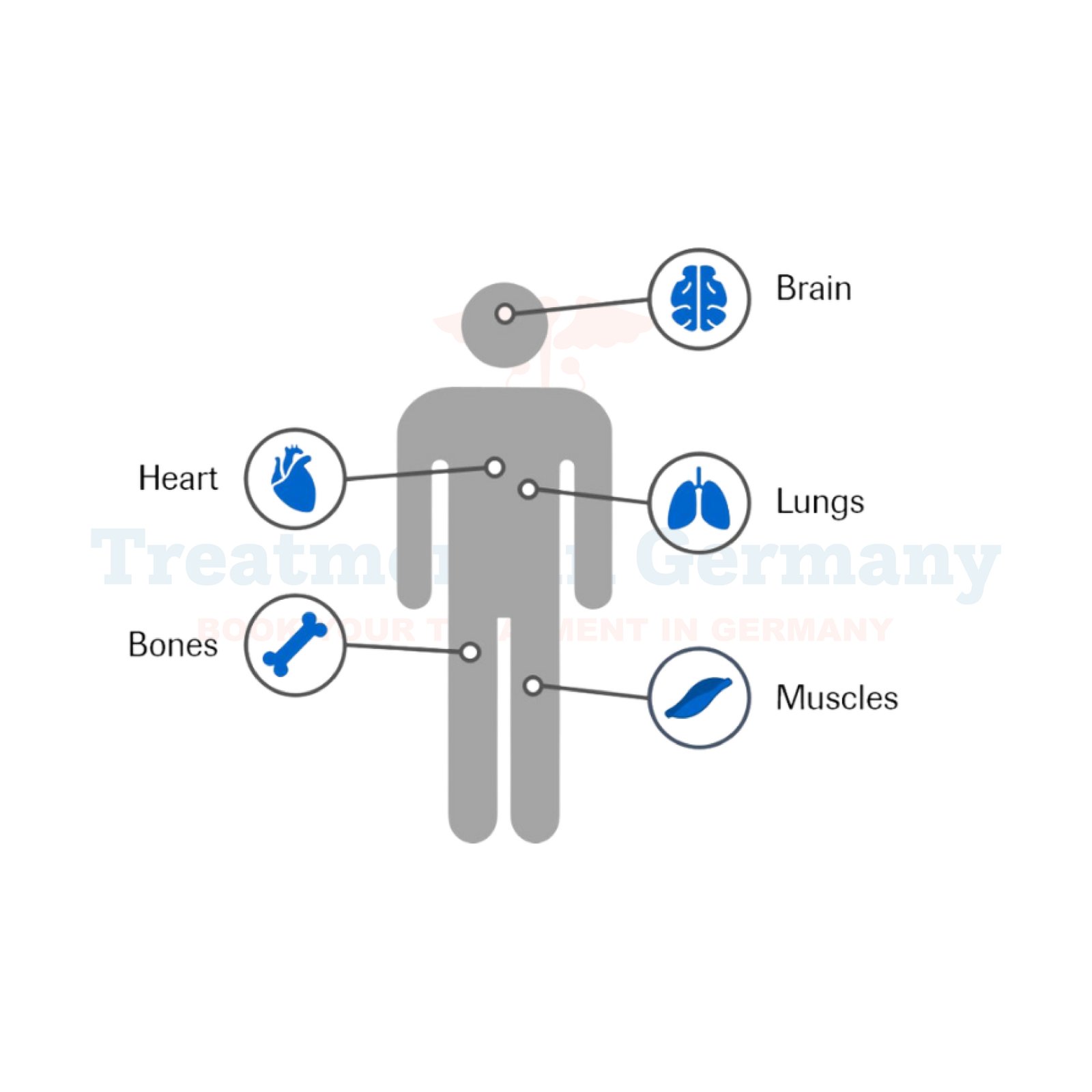Duchenne Muscular Dystrophy (DMD) Treatment in Germany
Duchenne muscular dystrophy (DMD) is a severe genetic disorder characterized by progressive muscle weakness and degeneration. It primarily affects boys, with symptoms usually appearing between the ages of 2 and 5. DMD is caused by mutations in the DMD gene, which encodes for dystrophin, a protein essential for muscle strength and function. Germany, known for its advanced healthcare system, offers cutting-edge treatments and therapies to manage DMD and improve patients' quality of life.
DMD is the most common form of muscular dystrophy in children. It is a genetic disorder inherited in an X-linked recessive pattern, which means it primarily affects males, while females are typically carriers. The lack of dystrophin leads to muscle fiber damage, causing progressive weakness and loss of function over time.
Causes of DMD
DMD is caused by mutations in the DMD gene located on the X chromosome. These mutations result in the absence or insufficient production of dystrophin, a protein crucial for stabilizing and protecting muscle fibers during contraction. Without dystrophin, muscle cells become fragile and prone to damage, leading to degeneration.
Symptoms of DMD
The symptoms of DMD typically appear in early childhood and worsen over time. Common signs include:
- Delayed motor milestones, such as sitting, standing, or walking.
- Frequent falls and difficulty climbing stairs.
- Enlarged calf muscles (pseudohypertrophy) due to fat and connective tissue buildup.
- Weakness in the hips, thighs, and shoulders.
- Gait abnormalities, such as walking on toes or waddling.
- Progressive loss of mobility, often requiring a wheelchair by adolescence.
- Respiratory and cardiac complications in later stages.
Diagnosis and Diagnostic Tools
Early diagnosis of DMD is crucial for effective management. German hospitals utilize advanced diagnostic techniques, including:
- Genetic Testing: Identifies mutations in the DMD gene, confirming the diagnosis.
- Creatine Kinase (CK) Blood Test: Elevated CK levels indicate muscle damage.
- Electromyography (EMG): Assesses muscle electrical activity.
- Muscle Biopsy: Examines muscle tissue for signs of dystrophin deficiency.
- MRI (Magnetic Resonance Imaging): Provides detailed imaging of muscle structure and damage.
Treatment Options for DMD in Germany
While there is no cure for DMD, Germany offers a comprehensive range of treatments to slow disease progression, manage symptoms, and improve quality of life. These include:
Medications
- Corticosteroids: Prednisone and deflazacort help delay muscle degeneration and improve strength.
- Exon Skipping Therapies: Drugs like eteplirsen target specific mutations, promoting the production of functional dystrophin.
- Gene Therapy: Germany is at the forefront of research into gene replacement therapies to restore dystrophin production.
Physical and Occupational Therapy
- Tailored exercise programs to maintain muscle strength and flexibility.
- Assistive devices like braces and standing frames to support mobility.
- Occupational therapy to improve daily living skills and independence.
Surgical Interventions
- Corrective surgeries for contractures and scoliosis.
- Cardiac device implantation to manage heart complications.
Advanced Therapies in Germany
Germany’s innovative healthcare system integrates advanced therapies, including:
- Stem Cell Therapy: Exploring its potential to regenerate muscle tissue and slow progression.
- Dendritic Cell Therapy: Although primarily used for immune modulation, research investigates its role in managing inflammation associated with DMD.
- Platelet-Rich Plasma (PRP) Therapy: Enhances healing and reduces inflammation in affected muscles.
- Respiratory Support: Non-invasive ventilation techniques to improve breathing in later stages.
Why Choose Treatment in Germany?
Germany is a global leader in DMD treatment due to its:
- World-Class Facilities: Equipped with the latest diagnostic and therapeutic technologies.
- Expert Specialists: Renowned neurologists, geneticists, and physiotherapists with extensive experience in managing DMD.
- Innovative Research: Pioneering advancements in gene therapy, exon skipping, and regenerative medicine.
- Holistic Approach: Comprehensive care addressing physical, emotional, and social aspects.
- Patient-Centered Care: Personalized treatment plans tailored to individual needs.
Prevention and Management
While DMD cannot be prevented, early diagnosis and proactive management can significantly improve outcomes. Key strategies include:
- Carrier Screening: Genetic testing for potential carriers to assess the risk of passing on the disorder.
- Regular Monitoring: Routine check-ups to track disease progression and manage complications.
- Nutritional Support: A balanced diet to maintain overall health and prevent obesity.
- Vaccinations: To reduce the risk of respiratory infections.
Conclusion
Duchenne muscular dystrophy is a challenging condition, but advancements in medical science and personalized care offer hope for improved management and quality of life. Germany’s state-of-the-art facilities, expert healthcare professionals, and innovative treatment options make it a leading destination for DMD care. Early diagnosis, combined with a multidisciplinary approach, ensures that patients receive the best possible support to navigate the challenges of this condition.
👉 Contact us for further information and receive a complimentary consultation.


.webp)
 (1).webp)

.webp)
 (1).webp)


.webp)
 (1).webp)

.webp)
 (1).webp)
